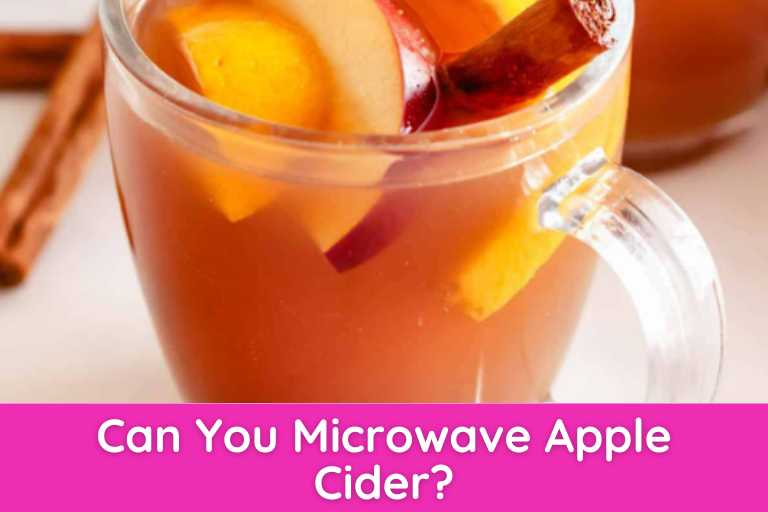Apple cider is one of the most popular drinks enjoyed around the world. Not only is it delicious and refreshing, but it has numerous health benefits as well.
But can you microwave apple cider without compromising its taste, nutritional value, and overall integrity? The answer to this question may surprise you. Let’s take a deeper look into the world of microwaving apple cider!
Can You Microwave Apple Cider?
Yes, you can microwave apple cider! It is a safe and easy way to quickly heat apple cider without ruining its flavor or nutritional value. However, it is important to note that microwaving apple cider will preserve a different freshness and depth of flavor than heating it on the stove. Additionally, microwaving can reduce some of the beneficial nutrients in the drink.
Can I heat apple juice in the microwave?
Yes, you can heat apple juice in the microwave. Use a microwave-safe container, and be careful not to overheat it. When microwaving apple juice, keep an eye on the container and ensure the juice does not boil over. Also, stir it frequently to help distribute the heat evenly. Enjoy your warm cup of apple juice!
Can you heat apple cider vinegar in the microwave?
Yes, you can heat apple cider vinegar in the microwave. Just be sure to use a microwavable container and monitor the heat while cooking. Never leave the container unattended, as overheating can cause the contents to boil. Heat cautiously, stirring occasionally, and enjoy your warm cup of apple cider vinegar!
Can apple cider be heated up?
Yes, apple cider can be heated up to enjoy a warm drink. Use a microwavable container and heat cautiously while monitoring the temperature. Ensure to occasionally stir throughout the process and never leave it unattended, as it can boil over. Enjoy your warm cup of apple cider!
Can you reheat hot apple cider?
Yes, apple cider can be heated up to enjoy a warm drink. Use a microwavable container and heat cautiously while monitoring the temperature. Ensure to occasionally stir throughout the process and never leave it unattended as it can boil over. Enjoy your warm cup of apple cider!
Is it OK to heat apple cider vinegar?
It is not recommended to heat apple cider vinegar as it can destroy beneficial nutrients and compromise its quality. Instead, it is best to use cold-pressed apple cider vinegar for the best results.
Is vinegar safe for microwaving?
Yes, vinegar is safe to use in the microwave. Just be sure to use a microwavable container and keep an eye on it while heating. It is important not to overexpose it to heat as this can cause a reaction with other substances that could damage the appliance. Also, always store vinegar away from heat sources.
Does vinegar damage the microwave?
Vinegar itself is not likely to damage the microwave, but it can react with other substances that could damage it. Therefore, it is important to be aware of what else is in the microwave while heating vinegar and not overexpose it to heat. Always store vinegar away from heat sources to avoid any possible accidental reactions.
Can you warm up cold apple cider?
Yes, you can warm up cold apple cider in the microwave. Pour the Cider into a microwavable container and heat for 30-second increments until the desired temperature is reached. Be mindful of not heating it too long, as this can cause an unwanted reaction with other substances. Enjoy your warm and cozy apple cider!
Can apple cider be cooked?
Yes, apple cider can be cooked! There are a variety of recipes out there for cooking with apple cider. From fall-inspired dishes like Slow Cooker Pork Chops with Apples and Cider to creative ideas such as Apple Cider Caramels or even Apple Cider Pound Cake, your options are endless!
Can you heat carbonated apple cider?
Typically, no. As carbonated beverages contain carbon dioxide and air, they expand when heated and can cause the liquid to bubble over or explode out of its container. Therefore, it is not recommended to heat carbonated apple cider in a microwave or otherwise.
What temperature do you heat Cider to?
When heating Cider for recipes, you should typically heat the Cider to a simmer. This is usually between 180°F and 185°F. Once it reaches this temperature, the Cider can be used in recipes or enjoyed on its own!
Does apple cider turn into alcohol?
No, apple cider does not turn into alcohol on its own. Cider is made from fermented apples, but fermentation does not turn it into an alcoholic beverage. To make hard Cider, extra yeast and sugar are added to create an alcoholic drink.
What is the difference between apple cider and mulled apple cider?
Apple cider is simply a drink made with fresh, pressed apples. It can be enjoyed as-is or used in recipes.
Mulled apple cider is apple cider that has been heated, typically with spices like cinnamon, allspice, nutmeg, and cloves. After heating, it can be served warm or hot with added spices for flavor.
How long is warm apple cider good for?
Warm apple cider can stay good for up to three days when stored in an airtight container in the refrigerator. However, consuming the Cider within 24 hours of heating is best, as quality and taste may be compromised after that period.
Can you heat hard Cider?
Yes, hard Cider can be heated. The best way to heat hard Cider is in a saucepan or a slow cooker. Both methods allow for gentle and even heating, which preserves the flavor and sweetness of the Cider.
How do you heat apple cider for a party?
Apple cider can be heated up in a Crock-Pot or slow cooker. Start by placing the desired apple cider into the slow cooker and set it on low heat. Allow the Cider to heat slowly, occasionally stirring until it reaches your preferred temperature.
This method ensures that your Cider is evenly heated and won’t burn or get too hot. You can also warm up larger quantities of Cider by utilizing a chafing dish or double boiler – both methods will keep your apple cider warm while avoiding overheating.
Conclusion
We hope this article has provided some insights into how best to warm up your favorite drink safely! What other tips do you have for heating apple cider at home? Share your thoughts in the comments below!




